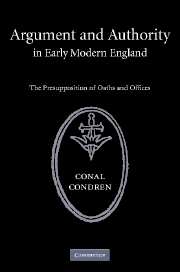Book contents
- Frontmatter
- Contents
- Preface
- Introduction
- Part I The liquid empire of office
- Part II The authority and insolence of office
- 7 The cases of patriot and counsellor
- 8 Casuistry as the mediation of office
- 9 The case of resistance to superior power
- 10 Metaphor and political autonomy
- Part III ‘I, A. B.’
- Epilogue
- Bibliography
- Index
9 - The case of resistance to superior power
from Part II - The authority and insolence of office
Published online by Cambridge University Press: 28 October 2009
- Frontmatter
- Contents
- Preface
- Introduction
- Part I The liquid empire of office
- Part II The authority and insolence of office
- 7 The cases of patriot and counsellor
- 8 Casuistry as the mediation of office
- 9 The case of resistance to superior power
- 10 Metaphor and political autonomy
- Part III ‘I, A. B.’
- Epilogue
- Bibliography
- Index
Summary
What is the cause that Europe groans at present under the heavy load of a cruel and expensive war, but the tyrannical custom of a certain nation, and the scrupulous nicety of a silly Queen.
(John Arbuthnot, The History of John Bull)If hostility is any guide, resistance theory was pervasive in the early modern world, but the tacit academic assumption has been that theory means justification, or advocacy – what else are theories about? In this ideological guise, resistance has assumed singular significance in narratives about sovereignty, democracy, liberty, liberalism and individualism. Yet, if scholars have been enthusiastic in its pursuit through the tomes of early modernity, they have often been left with the task of constructing theories from fragments and asides in order to do what previous writers should really have done for themselves. Duncan Forbes's remark, however, that expecting political philosophy to be preoccupied with resistance is like expecting treatises on marriage to be about divorce, has more than witticism to commend it. The analogy points to the casuistic nature of the problem. This was not lost on that spouse of Britain James VI&I. The notion that the people may act to preserve the commonwealth against the Free Monarch is to be condemned, he asserted, for the Bible tells us that no evil can be done that good may come of it. The purpose of this chapter is to return ‘resistance theory’ to the casuistry of office from whence it came.
- Type
- Chapter
- Information
- Argument and Authority in Early Modern EnglandThe Presupposition of Oaths and Offices, pp. 186 - 208Publisher: Cambridge University PressPrint publication year: 2006

